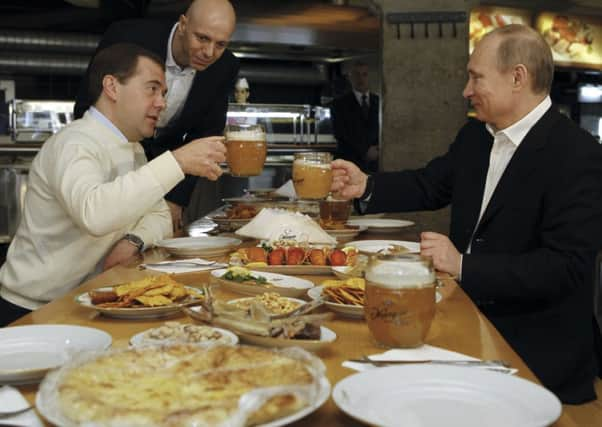Russian trade war could cost Scots companies £50m


President Vladimir Putin’s regime has hit back at sanctions imposed over the Ukraine crisis by outlawing the buying of food from European Union members and the United States.
Experts have estimated that Moscow’s action will cost western farmers billions of pounds and lead to empty shelves in Russian shops.
The US said Russia is imposing sanctions on its own people.
Advertisement
Hide AdAdvertisement
Hide AdDavid Cohen, under-secretary for terrorism and financial intelligence, said the US and its allies would never impede access to food or medicine.
The Ukraine crisis – which has been fuelled by claims that Moscow is backing pro-Russian separatists in the east of the country – had appeared to ease until the downing of Malaysia Airlines Flight MH17 over Donetsk last month.The West claimed the separatists were responsible for the loss of 298 lives.
In Scotland, food and drink exports to Russia totalled £50.494 million last year.
Russia is Scotland’s 26th biggest food and drink export market by value with dairy products, eggs, fish and seafood, fruit, vegetables and cereals shipped there.
A Scottish Government spokeswoman said: “The Scottish Government has made our concerns about the situation in the Ukraine clear and we fully support EU sanctions against Russia.
“Today’s action by Russia will inevitably have an impact on some sectors of our economy, most notably for our fish exporters and the Scottish Government is in contact with the food and drink industry to assess any implications.”
Fishing leaders warned that the ban would have “extremely serious implications” for mackerel fishing.
Bertie Armstrong, chief executive of the Scottish Fishermen’s Federation, said: “Although we have yet to examine the detail of these retaliatory sanctions, we are at this stage extremely concerned about the impact they will have on our mackerel fleet and the associated onshore processing sector.
Advertisement
Hide AdAdvertisement
Hide Ad“We recognise that this is a serious geopolitical issue, but the downstream impact will hit a number of business sectors including Scottish fishing.”
He added: “The solution to this international dispute is for Russia to come to the negotiating table.”
According to the National Farmers Union Scotland, there are concerns that the ban will also affect those who do not export to Russia.
The organisation’s Bob Carruth said: “What most people are concerned about is what the knock-on effects might be in areas where the UK is not a big trader in terms of exports to Russia.
“If Europe is shut out of Russia, it is also about where the rest of the European produce lands. One of the biggest growers of soft fruit is Poland and a huge proportion of Polish soft fruit went to Russia.
“If that soft fruit is no longer going to Russia, where is it going to go?
“The likelihood is that they are going to look at other markets in Europe and there would be knock-on impact for us. Supply would exceed demand.”
The Scottish Government spokeswoman gave a further warning of the consequences of the sanctions.
Advertisement
Hide AdAdvertisement
Hide AdShe said: “What these sanctions will deliver is a deepening of Russia’s international isolation, causing more damage to its own economy and people. The Scottish Government continues to call on Russia to take steps to de-escalate the conflict in East Ukraine.”
Yesterday’s decision by Mr Putin’s government suggested that Russia has no intention of bowing to western pressure over Ukraine which includes travel restrictions, and will instead try to strike back at the West.
It also demonstrated that the Kremlin is prepared to inflict damage on Russia while pursuing its course in Ukraine.
The import ban was announced by prime minister Dmitry Medvedev during a televised cabinet meeting.
He said the ban covers all imports of meat, fish, milk, milk products and fruit and vegetables from the US, the EU, Australia, Canada and Norway. It will last for one year.
“Until the last moment, we hoped that our foreign colleagues would understand that sanctions lead to a deadlock and no-one needs them,” he added. “But they didn’t and the situation now requires us to take retaliatory measures.”
Aside from the UK, other countries stand to lose more from the sanctions.
The Netherlands, one of the world’s largest agricultural exporters, sends €1.5 billion (£1.2bn) worth of agricultural products to Russia annually.
Advertisement
Hide AdAdvertisement
Hide AdAlbert Jan Maat, chairman of the Dutch Federation of Agriculture and Horticulture, warned that the ban will cause prices to drop across Europe because of huge oversupply. This could in turn lead to job losses.
He said to minimise the impact, officials were “thinking of either removing products from the market or temporarily storing them”.
Russia depends heavily on imported foodstuffs – most of it from the West – particularly in the largest and most prosperous cities such as Moscow.
Mr Medvedev argued that the ban would give Russian farmers, who have struggled to compete with western products, a good chance to increase their market share.
But experts said local producers will find it hard to fill the gap left by the ban, as the nation’s agricultural sector has continued to suffer from poor efficiency and shortage of funds.
While the government claimed it will move quickly to replace western imports by shipping in more food from Latin America, Turkey and former Soviet nations to avoid empty shelves and price hikes, analysts predicted that it will further speed up inflation.
The damage to consumers inflicted by the ban will be felt particularly hard in big cities such as the capital, where imported food fills an estimated 60-70 per cent of the market.